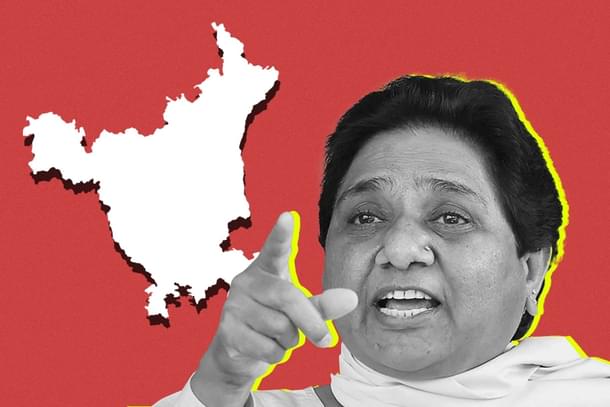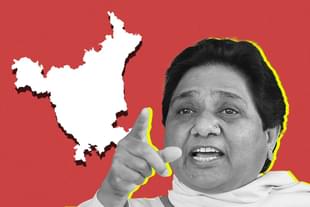Politics
Mayawati's Rebuke Of The 'Casteist People Of Jat Community' Comes From Over Two Decades Of Disappointment
Nishtha Anushree
Oct 09, 2024, 06:21 PM | Updated 06:19 PM IST
Save & read from anywhere!
Bookmark stories for easy access on any device or the Swarajya app.


Bahujan Samaj Party (BSP) supremo Mayawati has expressed her disappointment with the 'casteist people of the Jat community' as her party could not win a single seat in the Haryana assembly election.
The party's vote share also came down from 4.2 per cent in 2019 to 1.82 per cent this time. This happened despite allying with the Indian National Lok Dal (INLD).
Say we consider the fact that the BSP contested 87 seats in 2019 and 37 this time due to the alliance factor and adjusted the vote share expectation accordingly. Even in that case, the BSP's vote share appears to have remained unchanged.
This only means that the alliance with the INLD, considered to be a Jat party, did not help the BSP. On the contrary, the INLD's performance improved as it won two seats, up from one in 2019.
Its vote share also increased from 2.44 per cent to 4.16 per cent despite contesting only 53 seats this time, down from 81 in 2019.
"The casteist people of Jat community did not vote for BSP, while BSP's entire vote was transferred," Mayawati said.
Comparing Haryana with Uttar Pradesh, she said, "The people of the Jat community of UP have changed their casteist mentality to a great extent and they have become MLAs (members of the legislative assembly) from BSP and ministers in the government.
"The people of the Jat community of Haryana state should also follow their footsteps and change their casteist mentality. This is a special advice," she added.
Mayawati's rebuke of the Jat community is, however, not based on the Haryana election upset alone. She has been let down by Jat outfits multiple times.
The first such incident dates back to 2003. In 2002, Mayawati became chief minister of UP with the support of the Bharatiya Janata Party (BJP) and Rashtriya Lok Dal (RLD).
The RLD is currently an ally of the BJP under the National Democratic Alliance (NDA) umbrella. It holds influence over western UP and is considered to have a support base of Jats. In 2002, the RLD won 14 seats.
A year later, the RLD, under the leadership of Chaudhary Ajit Singh, withdrew support from the Mayawati government and extended support to Samajwadi Party (SP) founder Mulayam Singh Yadav.
Yadav then became chief minister in August 2003 and held the post until the 2007 assembly election, when Mayawati became chief minister once again as the BSP won a majority on its own.
Even when she was chief minister, another Jat leader, Mahendra Singh Tikait, used casteist slurs against her in a public address in Bijnore in 2008. Mayawati ordered his arrest.
After a struggle for three days between Tikait's supporters and UP police, Tikait surrendered in court, apologised to Mayawati for his comments, and called her his daughter.
The BSP has also not been able to maintain stable electoral alliances with land-owning communities like Jats in Haryana and Jatt Sikhs in Punjab.
In 2018 too, the BSP had allied with the INLD. However, as the Jannayak Janta Party (JJP) split from the INLD, the BSP felt that the INLD would not be able to help it much, and Mayawati unilaterally broke the alliance.
At that time, an image of Mayawati tying a rakhi to Abhay Chautala had gone viral. The image did not age well as the alliance broke a few months later without having contested elections together.
The same alliance was fortified this time, but it did not help the BSP. Similarly, the BSP's alliance with Shiromani Akali Dal (SAD) for the 2022 Punjab election was broken earlier this year.
SAD is considered to be a party of Sikhs, the largest land-owning community in Punjab who form 57 per cent of the state population. The BSP is considered to be a party of Dalits, who form 32 per cent of the state's population.
So, theoretically, this alliance should have succeeded. But instead, the seats and vote share of SAD came down, while they marginally increased for the BSP.
The alliance could win only four of the 117 assembly seats in Punjab, three by SAD and one by the BSP.
The electoral failures indicate a divide at the societal level where Jat-Jatav rivalry is prevalent in western UP and eastern Rajasthan. The Dalit Jatav community is the core voter of the BSP.
The Jats and Jatavs are not known to get along together in political spheres, which explains why Mayawati's alliances with such parties have never lasted for long.
However, Mayawati's criticism of certain communities for not voting for the BSP is new, as her party struggles for relevance in various states, including its fortress, UP.
After the Lok Sabha election, she asserted that despite the BSP giving representation to Muslim leaders, the goodwill is not being reciprocated in elections.
Mayawati cautioned that the BSP will henceforth give opportunities to Muslims only after careful consideration. A similar consideration may follow for alliances with so-called Jat parties.
Nishtha Anushree is Senior Sub-editor at Swarajya. She tweets at @nishthaanushree.





